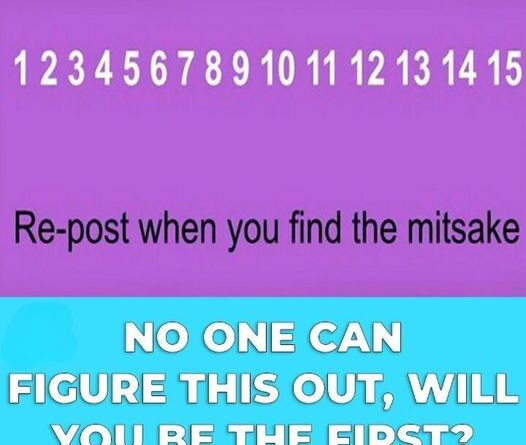Can You Spot the Mistake in This Puzzle?
Puzzles have long captivated intellectuals, presenting challenges that range from the simple and quick to the incredibly complex and time-consuming. Some puzzles remain unsolved even today.
People’s opinions on puzzles vary widely: some dislike them, while others are passionate enthusiasts. Regardless of personal preference, solving puzzles offers excellent mental exercise, teaching the brain to tackle problems from various angles to find solutions.
One particular puzzle has recently gained attention online, baffling many. At first glance, it doesn’t seem like a puzzle at all. It features numbers from 1 to 15 arranged in sequence, with a caption below asking viewers to repost once they find the error. Initially, everything appears correct: the numbers are in perfect order, with none missing or miswritten.
After repeated scrutiny, one might start considering unconventional possibilities: is the error the absence of zero or the number sixteen? Is it a spacing issue? Perhaps there’s a confusion between the letter ‘I’ and the number ‘1’? But all these elements appear flawless.
Eventually, a closer examination of the text reveals the real trick. The instructions ask you to find the ‘mitsake,’ not the error. Here lies the catch: the word “mistake” is intentionally misspelled as “mitsake,” diverting attention away from the actual error in the text itself.
This clever puzzle underscores the importance of looking at the bigger picture to solve problems. It’s a testament to the puzzle creator’s understanding of human nature, knowing many would overlook the obvious in search of a more complex error.
Solving puzzles has numerous benefits. Research indicates that puzzles enhance memory, particularly short-term memory, by challenging us to think quickly and act swiftly. This stimulates mental processes and strengthens connections between brain cells.
Moreover, puzzles develop excellent analytical skills, requiring both logical critical thinking and creativity. This particular puzzle, for instance, necessitates analyzing the entire image and recognizing that the trick lies in the question, not the numbers. Such skills are invaluable in daily life and the workplace, especially in leadership and management roles.
Therefore, regularly engaging in puzzles is a valuable habit to cultivate. It not only provides mental stimulation but also equips us with critical problem-solving skills that can give us an edge in various aspects of life.

